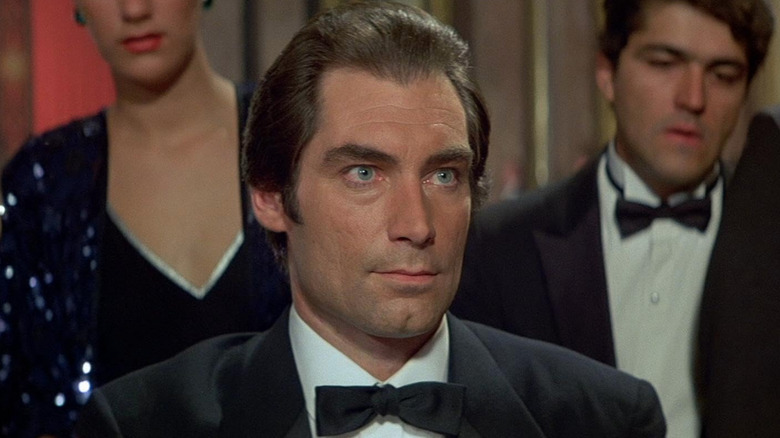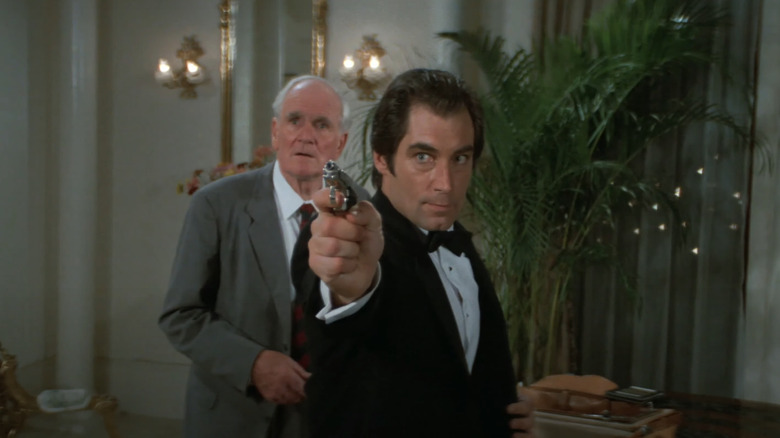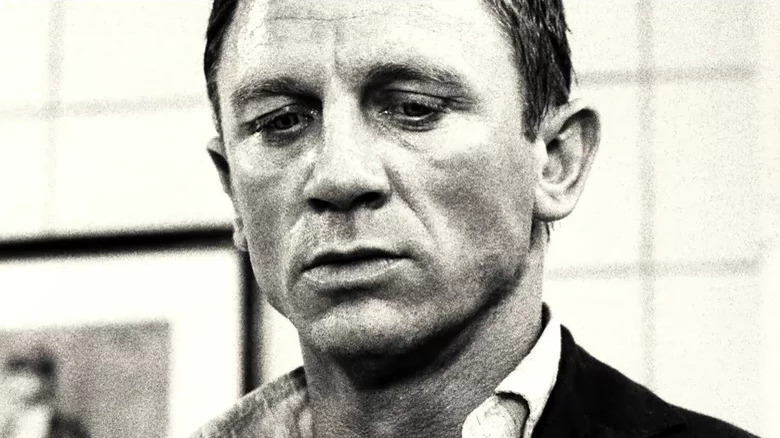Licence To Kill Locked James Bond's Producers In A Battle With British Censors
Being an international super spy comes with its share of drawbacks, which apparently include upsetting censors around the world. While James Bond has faced numerous censorship struggles throughout his more than 60-year on-screen run, he's often had a particular issue in his home country. For example, the original ending of 1971's "Diamonds Are Forever" was a little too S&M for the British censors, and was initially supposed to depict Jill St. John's Tiffany Case being tied to a bed by the charmingly bizarre Mr. Wint and Mr. Kidd (Bruce Glover and Putter Smith respectively). That was very quickly nixed by UK censors who felt it was a little too kinky even for Bond.
But kink was less of a concern for the British Board of Film Classification (BBFC) than violence. In a 2006 interview with Caped Wonder, "Diamonds" writer Tom Mankiewicz explained how "largely, the Brits cared a great deal about violence in terms of your ratings" and revealed that he'd originally included a scene that involved a scorpion being put "down the mouth." That seemed to particularly irk British censors, with Mankiewicz adding, "the Brits said, 'The kids will not be allowed to see that.' Although it's fine with the Americans."
The BBFC's preoccupation with violence as the most potentially damaging element of movies remained strong in the years after "Diamonds." By the time 1989's "Licence To Kill" arrived, not much had changed, and this time around Bond faced arguably his biggest homegrown censorship challenge.
Bond's home turf troubles
Daniel Craig wasn't the first to portray a gritty, realistic 007 when he debuted in what the best Bond film ever made, 2006's "Casino Royale." In 1987, Timothy Dalton introduced audiences to a more serious take on the character with "The Living Daylights," which unfortunately remains an otherwise underwhelming entry in the Bond canon. Still, Dalton's follow-up "Licence to Kill" (1989) managed to improve on its predecessor, but not without running afoul of the British censors.
In Matthew Field and Ajay Chowdhury's 2015 book, "Some Kind of Hero: The Remarkable Story of the James Bond Films," the authors recount how "Licence to Kill," with its "harder edge" landed director John Glen and legendary Bond producer Albert "Cubby" Broccoli in an intense battle with British censors. As the book recounts, the BBFC took particular issue with Robert Davi's drug lord Franz Sanchez whipping his girlfriend, Lupe Lamora (Talisa Soto). They also weren't too pleased with longtime Bond associate Felix Leiter (David Hedison) being maimed by Sanchez's sharks. The villain's death, which involved him being set on fire before perishing in an explosion, also caused issues.
As Field and Chowdury wrote, a cut of the film "was watched by [BBFC] president, James Ferman, six examiners and assorted young people aged fifteen to twenty," before being given a "15" certificate which prohibited anyone under that age seeing "Licence" in theaters. That same year, the BBFC created a new "12" rating to sit between its "PG" (Parental Guidance) and "15" categories. Tim Burton's box office smash "Batman" was the first to be designated this new rating, while Bond unfortunately missed out, with the BBFC announcing that there was "no support at all for reclassifying ['Licence'] as 12 even with cuts."
Bond vs the censors
As Matthew Field and Ajay Chowdhury explain in their book, the "15" rating directly "impacted a key demographic for ['Licence to Kill']," which failed to gain the newly introduced "12" rating even after numerous other scenes were removed. The authors listed several of these scenes:
"When Bond arrives in Isthmus City and watches coverage of Sanchez on television, he moodily drinks vodka and retrieves his Walther PPK from a hidden pouch. This latter moment appeared in the teaser trailer for the film. A sequence of Lupe Lamora depositing Bond on the beach (after helping him escape from Sanchez's home) was also cut."
While "Licence" was clearly a struggle to get past the British censors, it's nothing compared to Bond's overseas censorship issues. Prior to 2006's "Casino Royale," China's State Administration of Press, Publication, Radio, Film and Television (since renamed to The National Radio and Television Administration) had banned every single Bond movie ever released, mostly due to the fact 007 was engaged in an ongoing crusade against communism during the Cold War era. And if there's one thing the Chinese Communist Party doesn't like, it's a super spy out to destroy the very system on which their society is built.
That wariness continued even after the NRTA approved England's greatest spy for the first time, with 2012's "Skyfall" debuting in the country only after extensive cuts and re-edits were made (via The BBC). Still, Bond has since maintained a presence at the Chinese box office, with "No Time To Die" securing a Chinese release back in 2021. Shame about its shocker of an ending, though.


